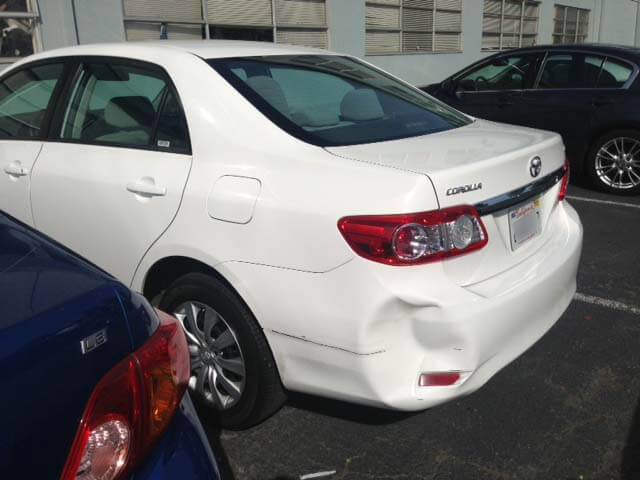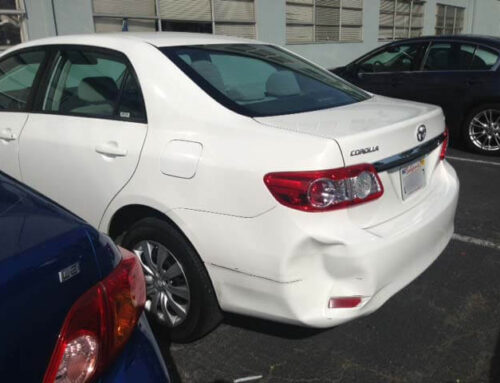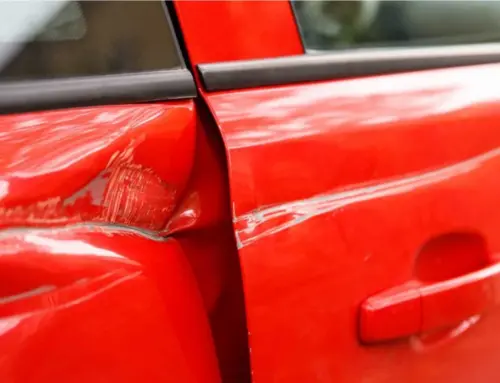A dent might look small, but it can lead to bigger problems than you’d expect. What seems like just a cosmetic issue can actually mess with your car’s structure, paint, and even resale value. Left alone, that little ding can invite rust, weaken the metal, or cause paint to peel—and that’s when repairs get expensive.
Dent repair isn’t just about keeping your car looking sharp. It’s about protecting it from long-term damage that slowly eats away at its value and performance. Whether it’s from a shopping cart, a hailstorm, or a minor bump, dealing with dents early can save you serious money down the road. Plus, it keeps your car running and looking like it should.
How does dent repair help prevent rust and corrosion on a vehicle?
Dent repair helps prevent rust and corrosion on a vehicle by addressing damage that could lead to moisture buildup and exposure to the elements. Here’s how it works:
- Sealing Out Moisture: Dents can create small cracks or gaps in the vehicle’s paintwork. When left untreated, these areas allow moisture, dirt, and road salts to penetrate the surface, which can lead to rust. Dent repair restores the car’s original shape, ensuring the paint remains intact and preventing moisture from seeping in.
- Preserving Protective Coating: A dent or scratch can damage the vehicle’s protective paint layer. Once the paint is compromised, the metal underneath is exposed to environmental elements that can cause corrosion. The protective coating is reinstated by repairing dents and restoring the paint, preserving the car’s metal surfaces.
- Stopping Corrosion Before It Starts: Dent repair, particularly methods like Paintless Dent Repair (PDR), doesn’t disturb the original paint, which helps avoid additional damage. By quickly addressing dents, rust is stopped from forming at early stages, avoiding costly repairs down the line.
- Maintaining Integrity of the Metal: Fix dents promptly to ensure the vehicle’s metal remains undamaged and structurally sound. This reduces the risk of corrosion spreading to other vehicle parts, ensuring long-term durability.
Prompt dent repair prevents moisture exposure and keeps your vehicle’s paint intact, reducing the likelihood of rust and corrosion and helping maintain the car’s longevity.
Can untreated dents lead to structural issues in a car?
Yes, untreated dents can lead to structural issues in a car over time. While small dents may seem harmless, they can compromise the integrity of the vehicle in several ways:
- Compromised Paint and Protective Coatings: Dents, especially deep ones, can crack the paint or protective coatings, exposing the metal underneath. Without the protective layer, the metal is more susceptible to rust and corrosion, which weakens the car’s structure and can cause long-term damage.
- Spread of Corrosion: If moisture, dirt, or road salts penetrate the exposed areas, they can start the corrosion process. As rust spreads, the vehicle’s frame can weaken, making it less stable and more prone to additional damage. This corrosion can eventually compromise key structural components, affecting the car’s safety and performance.
- Deformation of Structural Parts: A dent on a critical part of the vehicle, such as the frame or undercarriage, can lead to misalignment or further deformation. Over time, this can compromise the structural integrity of key areas and affect the car’s handling, performance, and safety.
- Impact on Airbags and Safety Features: Sometimes, dents near safety features like airbags or crumple zones can interfere with their functionality, making the car less safe in the event of an accident.
Untreated dents, especially in crucial areas, can lead to significant structural issues, making it important to address them promptly to maintain the vehicle’s safety, performance, and value.
How does professional dent repair maintain a car’s resale value?
Professional dent repair helps maintain a car’s resale value by restoring its appearance and preserving its structural integrity. Here’s how it impacts resale value:
- Restoring Aesthetics: A car’s appearance is one of the first things potential buyers notice. Dents and dings, especially if left untreated, can make a vehicle look poorly maintained, lowering its appeal and resale value. Professional dent repair restores the car’s original look, making it more attractive to buyers and increasing its market value.
- Preserving Original Paintwork: Paintless Dent Repair (PDR) and other professional methods typically avoid repainting, which means the vehicle’s original paint remains intact. This is important because the factory finish holds more value than a repainted surface, which may not match the original color or quality. Keeping the original paint helps maintain the car’s authenticity and resale price.
- Preventing Further Damage: Professional dent repair addresses the damage promptly, preventing it from worsening into more significant issues like rust or corrosion. Over time, untreated dents can lead to structural problems or increased maintenance costs, decreasing the car’s value. By fixing dents early, the car remains in better condition, making it more valuable when resold.
- Enhancing Perceived Value: A well-maintained car, free of dents and dings, gives the impression of being taken care of and less likely to have hidden issues. This can reassure potential buyers and increase offers, preserving the car’s resale value.
Professional dent repair improves the car’s visual appeal, helps protect its structural integrity, and preserves its original features, contributing to a higher resale value.
What hidden damages can a minor dent cause over time?
If left untreated, a minor dent can lead to several hidden damages over time, often exacerbating the issue and causing more significant problems. These include:
- Rust and Corrosion: A minor ding might shatter the vehicle’s paint or covering, revealing the metal. If moisture, dirt, and road salts enter these exposed regions, rust and corrosion can harm the vehicle’s frame and other components.
- Structural Weakness: Moisture and corrosion degrade metal surrounding dents. This might weaken the vehicle’s structure, making it more susceptible to accidents and wear and tear.
- Paint Damage and Fading: Many tiny dents cause paint chipping or cracking. Damaged paint exposes the underlying surface to UV radiation, debris, and moisture, fading and degrading the car’s exterior.
- Misalignment of Panels: Dents in body panels or frames can cause small misalignments. Over time, this can cause panel gaps, impairing car fit and finish. Misaligned panels weaken aerodynamics and affect door seals and window operation.
- Impact on Vehicle Safety: Dents near airbags or crumple zones can affect their function. This may reduce the vehicle’s collision safety.
- Increased Repair Costs: What starts as a minor dent can worsen over time due to exposure to the elements or improper handling. This can lead to more extensive damage that may require more expensive repairs, reducing the car’s overall value.
If left untreated, even a minor dent can trigger a range of hidden damages that compromise the car’s appearance, safety, and value over time. Prompt repair can prevent these issues and protect the vehicle’s long-term health.
Protect Your Car: Prevent Long-Term Damage with Dent Repair
Our professional services go beyond aesthetics, addressing underlying issues that could lead to rust, corrosion, or structural problems. By repairing dents promptly, we help preserve your vehicle’s integrity, ensuring it remains in top condition for years.
Whether it’s a minor dent or a more significant issue, our expert technicians use advanced techniques to restore your car’s beauty and functionality. Contact us today at Piedmont Dent Repair to schedule your dent repair and protect your investment!






